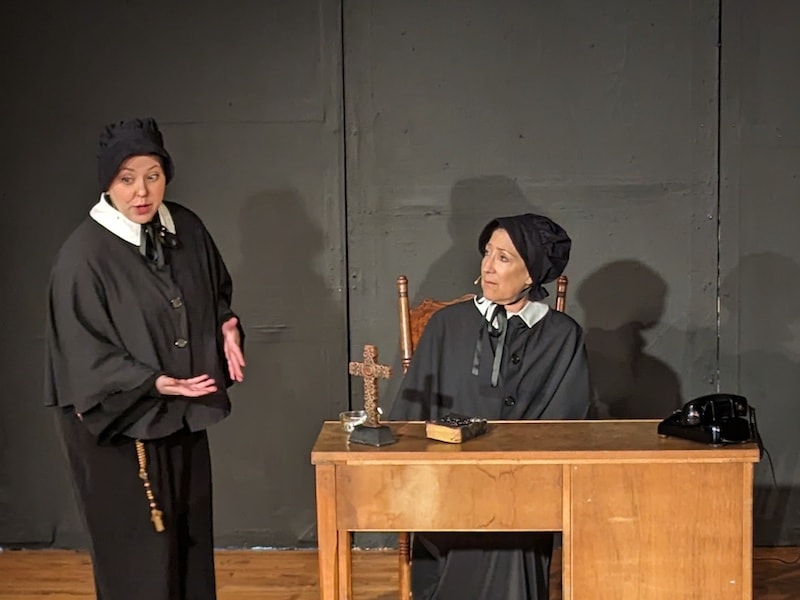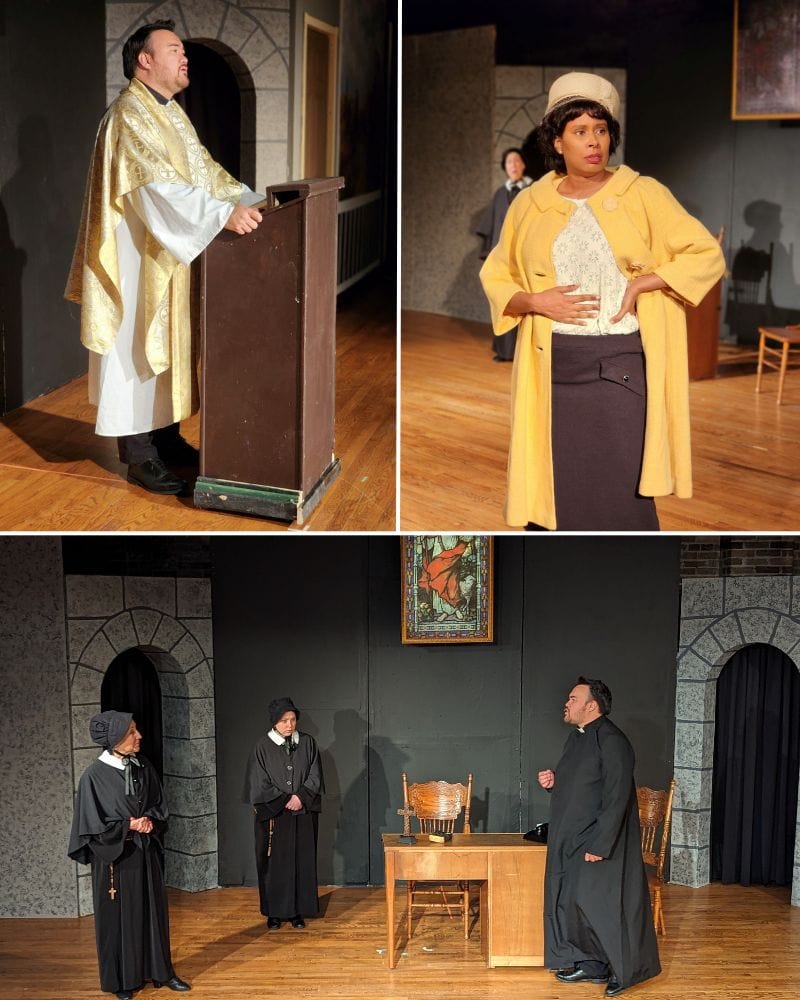By Isaac Welch
Rooftop Productions’ opening night of Doubt: A Parable by John Patrick Shanley showed a humble effort carried through by the heart of the Manassas community, through opening night jitters and competing acoustic accompaniment. As the run of eight shows began at the historic ARTfactory, Shanley’s frequently staged play found life again under the direction of Deb Hansen.
Unfortunately, just outside the ARTfactory that night was a band of lively street performers, whose wattage at times overpowered the play’s own audio system. Despite this interference, the cast maintained its composure as required by their characters, and an equal amount of respect and focus from the audience helped insulate the stage from distraction

In the play’s opening scene, Nathan Mikami introduces the character Father Brendan Flynn to the audience with a sermon; the priest at the center of this work’s point of contention brings into focus the thematic undercurrent that the audience will find themselves adrift in. Mikami’s early performance of Father Flynn sustains the pivotal role and grows into new dimensions as more is told of his activities at the St. Nicholas Church School and his relationship with its students. The play explores all facets of this character as a teacher, a coach, and a figure of high regard, but there are times when Mikami’s performance falters in accentuating the mannerisms and tendencies that convincingly illustrate a priest. Without the familiar pacing and vocal emphasis of sermon delivery, and lacking the embodiment of “holy spirit,” there is room in Mikami’s performance for more reverence to manifest.
Mikami’s confidence shows as the play progresses, allowing his Father Flynn to shine through in moments of defense and confrontation. Throughout the play, Mikami lends his strengths to the character in his dealings away from the congregation as allegations of coercive activity involving Donald Muller, the school’s first Black student, trace back to his name. Fist clenching and face reddening in moments of frustration, and voice dampening in his admissions and appeals, Mikami’s performance leaves the audience to learn about Father Flynn through his humanity more so than his holiness. Forgoing these dynamics in other compartments of his role, the juxtaposition between an impassioned priest, dedicated in his faith and fervent in his practice, and a mortal man burdened by the carnal temptations and sins of his past, becomes less stark.
The play’s second scene introduces Sister Aloysius Beauvier, played by Carolyn Corsano Wong, and Sister James, played by Raeanna Nicole Larson. Together, despite a strained dynamic, the pair strategize and confront Father Flynn for alleged misconduct and predatory behavior. Their argument stands upon unsettled observation and consequence amid uncertainty. Father Flynn parries the assertions as an attack on his character and recalls the structures they should aim at to honor in their institution. Without impartial knowledge of the events that occurred, the audience is left to remain unsure of the truth of the matter.
Larson and Wong’s performative relationship is influenced by the dynamics between teacher and principal, compassionate and conservative, elder and youth. Wong brings a poise and experience to her representation of Sister Aloysius that elevates this community production to a higher professional standard, unrelenting in her accusation against Father Flynn and unafraid of the disdain her methods may provoke. Larson tees up a wide-eyed eagerness in her acting of Sister James that is struck upon during a conversation between her and Sister Aloysius when Wong utters, “Look at you, you’d do anything for a warm look.” Both these actresses bring courage to their performances by allowing the less desirable traits of their characters to rise to the surface for full exploration.

Next to Wong, Tanya Johnson-Herron offers her contribution to the play with a most natural presence in her performance as Mrs. Muller. Though given only a short scene, Johnson-Herron makes effective use of her time on stage, adding crucial perspective as Donald Muller’s mother. With insight into his home life and personhood, dimensions are added to the young student’s situation that both widen the plane of uncertainty in the plot and tell further truths of the time and climate the play is set in. With class and rhythm, Johnson-Herron brings the production a performance that reveals, emotionally and upfront, the tests endured by the Black family amid the cultural restructurings of the 1960s. From here, the play sweeps into its climax as stakes increase and implications worsen. Both Father Flynn and Sister Aloysius threaten grave measures against one another, and conclusions await.
Nearing a stage of bared teeth, the cast seizes the opportunity to explore withheld emotions. Some of the best performances occur when characters abandon parish decorum.
The play is given an impressive set design consisting of a single backdrop of mural artwork depicting the St. Nicholas Church School. Stagehands transform the space between courtyards and offices, with just enough props to communicate each new setting. Nothing is overly decorated, as emphasis is placed not upon each room, but upon the exchanges and conversations that occur within them. With seating on three sides of the stage, the cast navigates multiple dimensions, knowing that their eyes may be met as they stare off out a suggested window or enter the stage through an aisle that also serves as a corridor.
In a play that concludes in ambiguity, the cast did well in their delivery to emphasize caveats and certain points of contention within the script that may sway audience members to believe one narrative over the other. Requiring constant attention and sustained energy, this play progresses at a pace that allows the storyline to accrue tension until its climax. The play’s congruence with the cast’s persistence results in a performance that both honors Shanley’s critically acclaimed work and welcomes the community to partake in its experience.
Running Time: Approximately 85 minutes, without intermission.
Doubt: A Parable plays through April 14, 2024, presented by Rooftop Productions performing in the Wind River Chimes Theater (3rd floor) at the ARTFactory, 9419 Battle Street, Manassas, VA. Tickets ($25–$30) are available online or through the box office at 703-330-2787, Monday to Saturday, 10 am to 5 pm.
 Isaac Welch is a journalist based in Southeast Washington, DC.
Isaac Welch is a journalist based in Southeast Washington, DC.




